2005 Portuguese legislative election
The Portuguese legislative election of 2005 took place on 20 February. The election renewed all 230 members of the Assembly of the Republic.
| ||||||||||||||||||||||||||||||||||||||||||||||||||||||||||||||||||||||||||||||||||||||
230 seats to the Portuguese Assembly 116 seats needed for a majority | ||||||||||||||||||||||||||||||||||||||||||||||||||||||||||||||||||||||||||||||||||||||
|---|---|---|---|---|---|---|---|---|---|---|---|---|---|---|---|---|---|---|---|---|---|---|---|---|---|---|---|---|---|---|---|---|---|---|---|---|---|---|---|---|---|---|---|---|---|---|---|---|---|---|---|---|---|---|---|---|---|---|---|---|---|---|---|---|---|---|---|---|---|---|---|---|---|---|---|---|---|---|---|---|---|---|---|---|---|---|
| Opinion polls | ||||||||||||||||||||||||||||||||||||||||||||||||||||||||||||||||||||||||||||||||||||||
| Registered | 8,944,508 | |||||||||||||||||||||||||||||||||||||||||||||||||||||||||||||||||||||||||||||||||||||
| Turnout | 5,747,834 (64.3%) | |||||||||||||||||||||||||||||||||||||||||||||||||||||||||||||||||||||||||||||||||||||
| ||||||||||||||||||||||||||||||||||||||||||||||||||||||||||||||||||||||||||||||||||||||
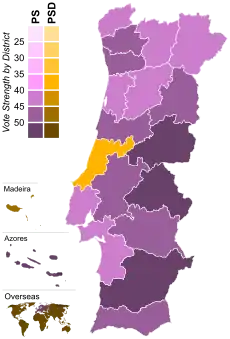 Results by district or autonomous region. | ||||||||||||||||||||||||||||||||||||||||||||||||||||||||||||||||||||||||||||||||||||||
| ||||||||||||||||||||||||||||||||||||||||||||||||||||||||||||||||||||||||||||||||||||||
These elections were called after the decision of President Jorge Sampaio on 30 November 2004 to dissolve the Parliament as an answer to the political instability caused by the government led by Pedro Santana Lopes (PSD) in coalition with the PP. Santana Lopes had become Prime Minister in July 2004, after José Manuel Durão Barroso left the country in order to become President of the European Commission in a decision that divided the country, because many Portuguese were expecting that the Socialist President Jorge Sampaio would dissolve the Parliament and call a legislative election. However, after five unstable months, President Sampaio decided to dissolve Parliament and call fresh elections. The Prime Minister nevertheless announced the resignation of the government on 11 December, in an action with no practical effects whatsoever.
The campaign started officially on 6 February and the major topics were the problematic state of the country's finances, unemployment, abortion and even José Sócrates's alleged homosexuality.[6][7]
Headed by Sócrates, the centre-left Socialist Party (PS) won the election with a landslide victory, winning in 19 of the 22 electoral constituencies, including in districts such as Viseu and Bragança that historically voted for the right. The Socialist Party conquered its first absolute majority, receiving 45% of the electorate vote and 52% of the seats in the Parliament. The centre-right parties, mainly the Social Democrats, were punished for their performance in government, and lost more than 11% of votes they had garnered in the previous election. On the left, the Left Bloc achieved its best result ever and made the biggest climb, gaining 5 MPs, while the CDU (Communists and the Greens) gained 2 MPs and reversed their downward trend of the last elections.
A curiosity about this election is that, as of 2020, both leaders of the two main parties, José Sócrates and Pedro Santana Lopes, are no longer members of their respective parties.[8][9]
Voter turnout was the highest since 1995, as 64.3% of the electorate cast a ballot.
Electoral system
The Assembly of the Republic has 230 members elected to four-year terms. Governments do not require absolute majority support of the Assembly to hold office, as even if the number of opposers of government is larger than that of the supporters, the number of opposers still needs to be equal or greater than 116 (absolute majority) for both the Government's Programme to be rejected or for a motion of no confidence to be approved.[10]
The number of seats assigned to each district depends on the district magnitude.[11] The use of the d'Hondt method makes for a higher effective threshold than certain other allocation methods such as the Hare quota or Sainte-Laguë method, which are more generous to small parties.[12]
For these elections, and compared with the 2002 elections, the MPs distributed by districts were the following:[13]
| District | Number of MPs |
|---|---|
| Lisbon | 48 |
| Porto | 38 |
| Braga | 18 |
| Setúbal | 17 |
| Aveiro | 15 |
| Leiria | 10 |
| Santarém | 10 |
| Coimbra | 10 |
| Viseu | 9 |
| Faro | 8 |
| Madeira | 6 (+1) |
| Viana do Castelo | 6 |
| Azores | 5 |
| Vila Real | 5 |
| Castelo Branco | 5 |
| Guarda | 4 |
| Bragança | 4 |
| Beja | 3 |
| Évora | 3 |
| Portalegre | 2 (-1) |
| Europe | 2 |
| Outside Europe | 2 |
Parties
The table below lists the parties represented in the Assembly of the Republic during the 9th legislature (2002-2005) and that also partook in the election:
| Name | Ideology | Political position | Leader | 2002 result | |||
|---|---|---|---|---|---|---|---|
| Votes (%) | Seats | ||||||
| PPD/PSD | Social Democratic Party Partido Social Democrata |
Liberal conservatism Classical liberalism |
Centre-right | Pedro Santana Lopes | 40.2% | 105 / 230 | |
| PS | Socialist Party Partido Socialista |
Social democracy | Centre-left | José Sócrates | 37.8% | 96 / 230 | |
| CDS-PP | CDS – People's Party Centro Democrático e Social – Partido Popular |
Christian democracy Conservatism |
Centre-right to right-wing |
Paulo Portas | 8.7% | 14 / 230 | |
| PCP | Portuguese Communist Party Partido Comunista Português |
Communism Marxism–Leninism |
Far-left | Jerónimo de Sousa | 6.9% [lower-alpha 1] |
10 / 230 | |
| PEV | Ecologist Party "The Greens" Partido Ecologista "Os Verdes" |
Eco-socialism Green politics |
Left-wing | Heloísa Apolónia | 2 / 230 | ||
| BE | Left Bloc Bloco de Esquerda |
Democratic socialism Anti-capitalism |
Left-wing | Francisco Louçã | 2.7% | 3 / 230 | |
Campaign period
Party slogans
| Party or alliance | Original slogan | English translation | Refs | |
|---|---|---|---|---|
| PSD | « Por amor a Portugal. » | "For love of Portugal" | [14] | |
| PS | « Voltar a acreditar em Portugal » | "Believing in Portugal again" | [15] | |
| CDS–PP | « O voto útil para Portugal » | "The useful vote for Portugal" | [16] | |
| CDU | « Agora é consigo » | "Now it's up to you" | [17] | |
| BE | « Faz toda a diferença » | "It makes all the difference" | [18] | |
Candidates' debates
| 2005 Portuguese legislative election debates | |||||||||||||||||||||
|---|---|---|---|---|---|---|---|---|---|---|---|---|---|---|---|---|---|---|---|---|---|
| Date | Organisers | Moderator(s) | P Present A Absent invitee N Non-invitee | ||||||||||||||||||
| PSD Santana |
PS Sócrates |
CDS–PP Portas |
CDU Jerónimo |
BE Louçã |
Refs | ||||||||||||||||
| 18 Jan | SIC Notícias | N | N | N | P | P | [19] | ||||||||||||||
| 20 Jan | SIC Notícias | N | N | P | N | P | [20] | ||||||||||||||
| 25 Jan | SIC Notícias | N | N | P | P | N | [19] | ||||||||||||||
| 3 Feb | RTP2, SIC, Antena 1, TSF |
Maria Flor Pedroso Rodrigo Guedes de Carvalho José Gomes Ferreira Ricardo Costa |
P | P | N | N | N | [21] | |||||||||||||
| 15 Feb | RTP1 | Judite de Sousa José Alberto Carvalho |
P | P | P | P | P | [22] | |||||||||||||
| Candidate viewed as "most convincing" in each debate | |||||||||||||||||||||
| Date | Organisers | Polling firm/Link | |||||||||||||||||||
| PSD | PS | CDS–PP | CDU | BE | Notes | ||||||||||||||||
| 3 Feb | RTP2, SIC, Antena 1, TSF | Aximage | 20.2 | 50.4 | N/A | N/A | N/A | 29.6% Tie | |||||||||||||
Opinion polling
National summary of votes and seats
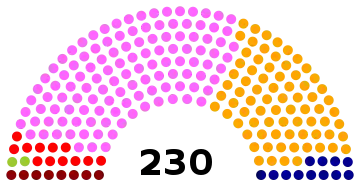 | ||||||||||
| Parties | Votes | % | ± | MPs | MPs %/ votes % | |||||
|---|---|---|---|---|---|---|---|---|---|---|
| 2002 | 2005 | ± | % | ± | ||||||
| Socialist | 2,588,312 | 45.03 | 96 | 121 | 52.61 | 1.17 | ||||
| Social Democratic[A] | 1,653,261 | 28.76 | 105 | 75 | 32.61 | 1.13 | ||||
| Unitary Democratic Coalition[B] | 433,243 | 7.54 | 12 | 14 | 6.09 | 0.81 | ||||
| People's | 416,415 | 7.25 | 14 | 12 | 5.22 | 0.72 | ||||
| Left Bloc | 364,909 | 6.35 | 3 | 8 | 3.48 | 0.55 | ||||
| Portuguese Workers' Communist | 48,186 | 0.84 | 0 | 0 | 0.00 | 0.0 | ||||
| New Democracy | 40,358 | 0.70 | N/A | N/A | 0 | N/A | 0.00 | N/A | 0.0 | |
| Humanist | 17,182 | 0.30 | 0 | 0 | 0.00 | 0.0 | ||||
| National Renovator | 9,374 | 0.16 | 0 | 0 | 0.00 | 0.0 | ||||
| Workers Party of Socialist Unity | 5,535 | 0.10 | 0 | 0 | 0.00 | 0.0 | ||||
| Democratic Party of the Atlantic[C] | 1,618 | 0.03 | N/A | N/A | 0 | N/A | 0.00 | N/A | 0.0 | |
| Total valid | 5,578,393 | 97.06 | 230 | 230 | 100.00 | — | ||||
| Blank ballots | 103,537 | 1.80 | ||||||||
| Invalid ballots | 65,515 | 1.14 | ||||||||
| Total | 5,747,608 | 100.00 | ||||||||
| Registered voters/turnout | 8,944,508 | 64.26 | ||||||||
| A From the Social Democratic electoral lists were elected two MPs from the People's Monarchist Party and other two MPs from Earth Party. B Portuguese Communist Party (12 MPs) and "The Greens" (2 MPs) ran in coalition.[23] C Democratic Party of the Atlantic electoral list only in Azores. | ||||||||||
| Source: Comissão Nacional de Eleições | ||||||||||
Distribution by constituency
| Constituency | % | S | % | S | % | S | % | S | % | S | Total S |
|---|---|---|---|---|---|---|---|---|---|---|---|
| PS | PSD | CDU | CDS-PP | BE | |||||||
| Azores | 53.1 | 3 | 34.4 | 2 | 1.7 | - | 4.0 | - | 2.9 | - | 5 |
| Aveiro | 41.1 | 8 | 35.7 | 6 | 3.5 | - | 9.8 | 1 | 5.1 | - | 15 |
| Beja | 51.0 | 2 | 12.3 | - | 24.1 | 1 | 2.9 | - | 4.7 | - | 3 |
| Braga | 45.4 | 9 | 32.9 | 7 | 4.8 | 1 | 7.8 | 1 | 4.6 | - | 18 |
| Bragança | 42.1 | 2 | 39.0 | 2 | 2.0 | - | 9.7 | - | 2.5 | - | 4 |
| Castelo Branco | 56.0 | 4 | 26.7 | 1 | 3.8 | - | 5.3 | - | 3.7 | - | 5 |
| Coimbra | 45.4 | 6 | 31.9 | 4 | 5.5 | - | 5.5 | - | 6.3 | - | 10 |
| Évora | 49.7 | 2 | 16.7 | - | 20.9 | 1 | 3.7 | - | 4.6 | - | 3 |
| Faro | 49.3 | 6 | 24.6 | 2 | 6.9 | - | 5.8 | - | 7.7 | - | 8 |
| Guarda | 46.8 | 2 | 34.7 | 2 | 2.9 | - | 7.0 | - | 3.4 | - | 4 |
| Leiria | 35.6 | 4 | 39.8 | 5 | 4.6 | - | 8.9 | 1 | 5.5 | - | 10 |
| Lisbon | 44.1 | 23 | 23.7 | 12 | 9.8 | 5 | 8.2 | 4 | 8.8 | 4 | 48 |
| Madeira | 35.0 | 3 | 45.2 | 3 | 3.6 | - | 6.6 | - | 3.8 | - | 6 |
| Portalegre | 54.9 | 2 | 20.2 | - | 12.1 | - | 4.2 | - | 4.6 | - | 2 |
| Porto | 48.5 | 20 | 27.8 | 12 | 5.4 | 2 | 6.9 | 2 | 6.7 | 2 | 38 |
| Santarém | 46.1 | 6 | 26.4 | 3 | 8.6 | 1 | 6.9 | - | 6.5 | - | 10 |
| Setúbal | 43.6 | 8 | 16.1 | 3 | 20.0 | 3 | 5.1 | 1 | 10.3 | 2 | 17 |
| Viana do Castelo | 42.0 | 3 | 33.5 | 2 | 3.8 | - | 11.4 | 1 | 4.5 | - | 6 |
| Vila Real | 43.8 | 3 | 40.2 | 2 | 2.6 | - | 6.8 | - | 2.4 | - | 5 |
| Viseu | 40.4 | 4 | 40.2 | 4 | 2.2 | - | 8.6 | 1 | 3.3 | - | 9 |
| Europe | 54.3 | 1 | 27.2 | 1 | 4.2 | - | 3.4 | - | 2.3 | - | 2 |
| Rest of the World | 26.3 | - | 57.7 | 2 | 1.0 | - | 3.5 | - | 0.7 | - | 2 |
| Total | 45.0 | 121 | 28.8 | 75 | 7.5 | 14 | 7.2 | 12 | 6.4 | 8 | 230 |
| Source: Comissão Nacional de Eleições | |||||||||||
Maps
.png.webp) Most voted political force by municipality.
Most voted political force by municipality.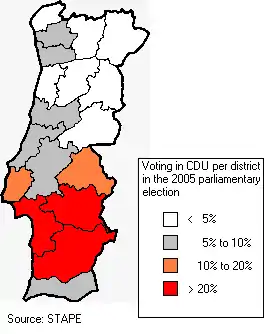 Share of vote for CDU by district.
Share of vote for CDU by district.
Graphics
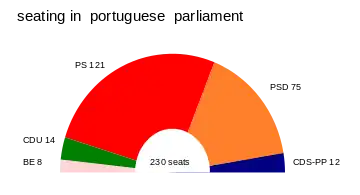 Seats won by party.
Seats won by party.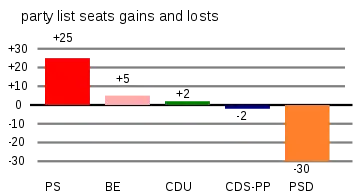 Gains and losses by party.
Gains and losses by party.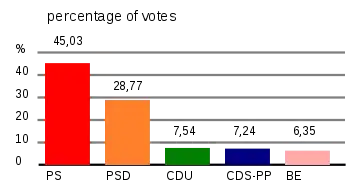 Share of vote by party.
Share of vote by party.
Further reading
- Freire, André; Marina Costa Lobo (May 2006). "The Portuguese 2005 legislative election: Return to the left". West European Politics. 29 (3): 581–588. doi:10.1080/01402380600620742.
Notes
- The Portuguese Communist Party (PCP) and the Ecologist Party "The Greens" (PEV) contested the 2002 election in a coalition called Unitary Democratic Coalition (CDU) and won a combined 6.9% of the vote and elected 12 MPs to parliament.
References
- Assembleia da República - Deputados e Grupos Parlamentares
- Assembleia da República - Deputados e Grupos Parlamentares
- Assembleia da República - Deputados e Grupos Parlamentares
- Assembleia da República - Deputados e Grupos Parlamentares
- Assembleia da República - Deputados e Grupos Parlamentares
- Santos Costa, Filipe (2 February 2005). "Santana nega ter feito insinuações" [Santana denies having made insinuations]. Diário de Notícias (in Portuguese). Retrieved 8 June 2016.
- Paixão, Paulo (23 September 2009). "Temas que marcaram a campanha das legislativas de 2005" [Themes that marked the 2005 election campaign]. Expresso (in Portuguese). Retrieved 8 June 2016.
- Tavares, Rita (4 May 2018). "Sócrates entrega o cartão de militante e abandona o PS" [Socrates hands over the membership card and leaves the PS]. Observador (in Portuguese). Retrieved 6 July 2020.
- Porfírio, João (27 Jun 2018). "Santana Lopes deixa o PSD e prepara novo partido" [Santana Lopes leaves PSD and prepares new party]. Observador (in Portuguese). Retrieved 6 July 2020.
- "Constitution of the Portuguese Republic" (PDF). Archived from the original (PDF) on 2016-03-03. Retrieved 2019-12-29.
- "Effective threshold in electoral systems". Trinity College, Dublin. Retrieved 2015-10-21.
- Gallaher, Michael (1992). "Comparing Proportional Representation Electoral Systems: Quotas, Thresholds, Paradoxes and Majorities"
- "Mapa Oficial n.º 5-A/2004" (PDF). CNE - Comissão Nacional de Eleições - DR I Série-A, nº 301, 27 de Dezembro de 2004. Retrieved 2 December 2020.
- "ELEIÇÕES LEGISLATIVAS DE 2005 – PSD". EPHEMERA (in Portuguese). Retrieved 11 May 2020.
- "PS recusa proposta de debate entre José Sócrates e Santana Lopes". TVI (in Portuguese). Retrieved 11 May 2020.
- "ELEIÇÕES LEGISLATIVAS DE 2005 – CDS". EPHEMERA (in Portuguese). Retrieved 11 May 2020.
- "Documents". PCP (in Portuguese). Retrieved 11 May 2020.
- "ELEIÇÕES LEGISLATIVAS DE 2005 – BE". EPHEMERA (in Portuguese). Retrieved 11 May 2020.
- "Televisões apostam nos debates políticos". Correio da Manhã (in Portuguese). 18 January 2005. Retrieved 11 May 2020.
- "Portas e Louçã travaram debate aceso a propósito do aborto e da banca". Público (in Portuguese). 21 January 2005. Retrieved 11 May 2020.
- "Debate inovador ao estilo americano". Diário de Notícias (in Portuguese). 3 February 2005. Retrieved 11 May 2020.
- "DEBATE: LEGISLATIVAS 2005". RTP1 (in Portuguese). 2005. Retrieved 11 May 2020.
- "Electoral results - Assembly of the Republic". Archived from the original on 2012-07-16. Retrieved 2019-02-17.
.jpg.webp)

.jpg.webp)
.jpg.webp)
.jpg.webp)